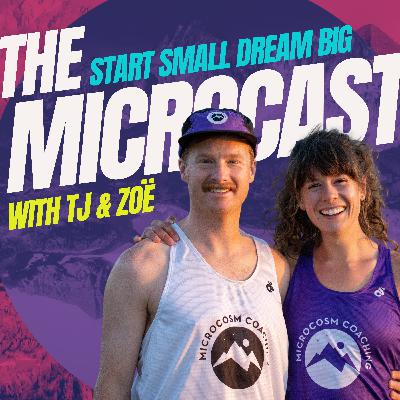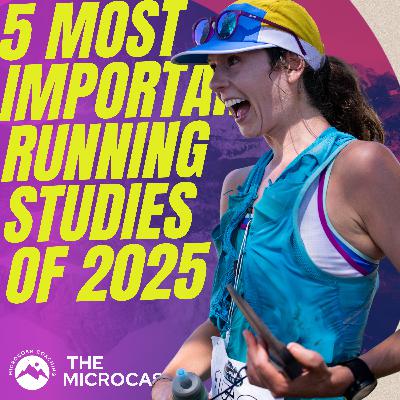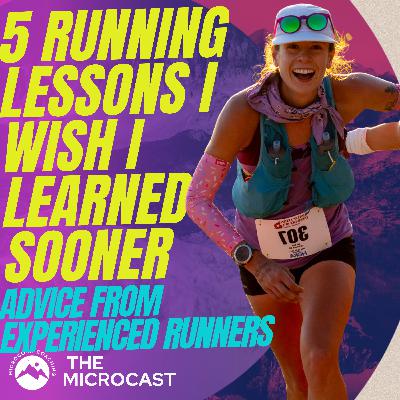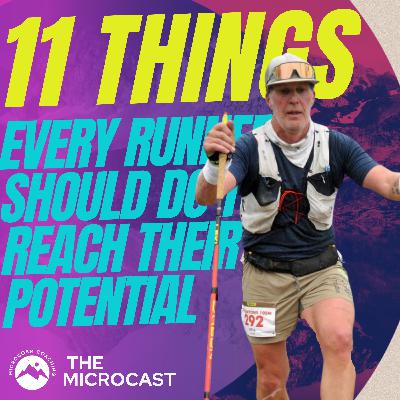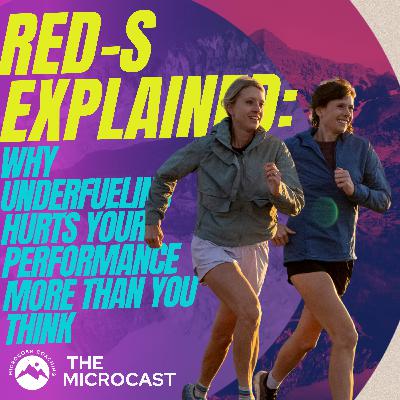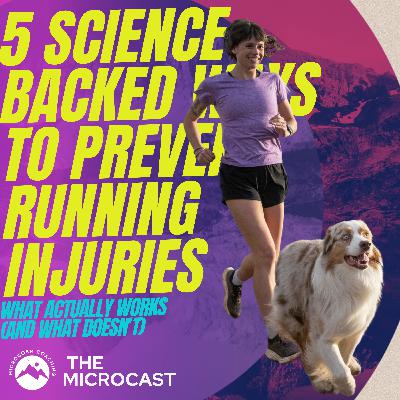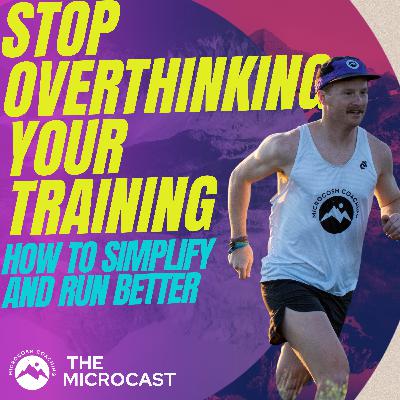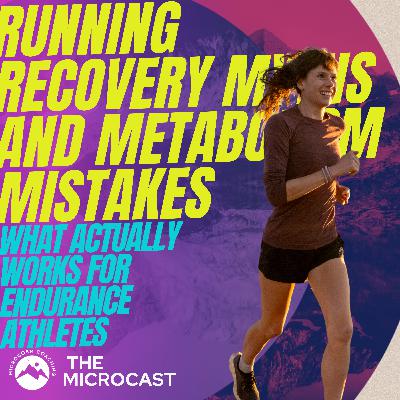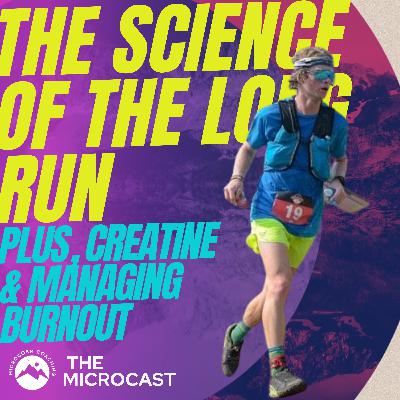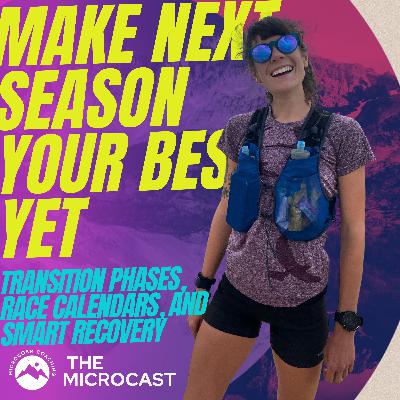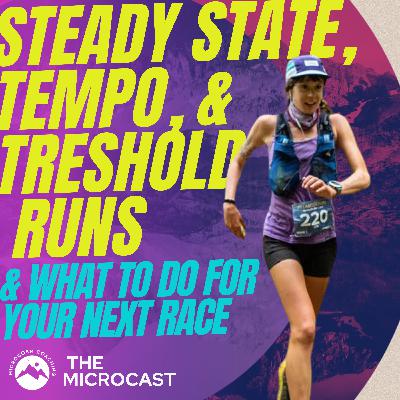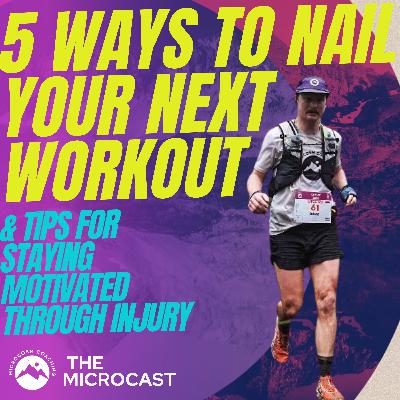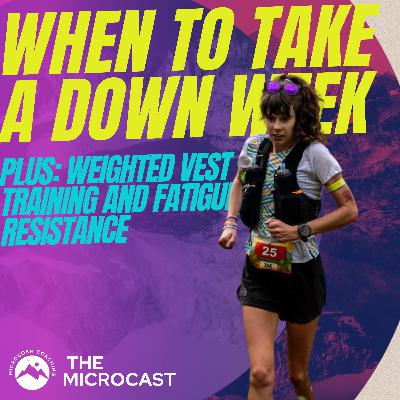Discover The MicroCast
The MicroCast

The MicroCast
Author: Microcosm Coaching
Subscribed: 7Played: 276Subscribe
Share
© Microcosm Coaching
Description
The Microcosm Coaching Podcast helps endurance athletes—whether you're a road runner, trail runner, or training for your first marathon or 100-miler—get more out of their training with evidence-based advice, effort-based coaching, and expert mindset support. Hosted by professional coaches and athletes, each episode explores practical strategies for race prep, running recovery, mental performance, and sustainable training. If you want to build fitness, avoid burnout, and find more joy in running, you're in the right place.
214 Episodes
Reverse
Is fasted running sabotaging your performance? Are you accidentally under-eating on your hardest training days? This week, we break down the seven most common nutrition mistakes runners make, from calorie restriction at the wrong time to blindly copying elite protocols, and explain why the science says you probably need to eat more, not less.We cover why your gut issues might actually be a training problem, not a food problem. We talk about why "clean eating" is often just restriction in disguise. And we explain why doing what Kipchoge does probably isn't what you should be doing.Plus, we answer listener questions on accountability and whether high-carb fueling causes diabetes (spoiler: it doesn't). And Coach James Nance joins to talk about coaching multi-sport athletes, helping runners recover from overtraining, and his TrainingPeaks hot take that might surprise you.In this episode:Why restricting calories on training days backfiresThe truth about fasted running and morning workoutsHow to actually fix gut issues during exerciseWhy "clean eating" can become problematicWhat 90-120g of carbs per hour actually means for recreational runnersHow to evaluate nutrition advice and follow the moneyStudies and resources mentioned are linked below.Get involved: Join our Foothills coaching community—one-on-one coach access, twice-monthly roundtables, and a supportive crew of runners. $10/month with code FOOTHILLS10 at microcosm-coaching.com.Questions? microcosmcoaching@gmail.comREFERENCES:Burke, L. M., Ross, M. L., Garvican-Lewis, L. A., Welvaert, M., Heikura, I. A., Forbes, S. G., Mirtschin, J. G., Cato, L. E., Strobel, N., Sharma, A. P., & Hawley, J. A. (2017). Low carbohydrate, high fat diet impairs exercise economy and negates the performance benefit from intensified training in elite race walkers. Journal of Physiology, 595(9), 2785–2807.Costa, R. J. S., Hoffman, M. D., & Stellingwerff, T. (2019). Considerations for ultra-endurance activities: Part 1 – Nutrition. Research in Sports Medicine, 27(2), 166–181.Cox, G. R., Clark, S. A., Cox, A. J., Halson, S. L., Hargreaves, M., Hawley, J. A., Jeacocke, N., Snow, R. J., Yeo, W. K., & Burke, L. M. (2010). Daily training with high carbohydrate availability increases exogenous carbohydrate oxidation during endurance cycling. Journal of Applied Physiology, 109(1), 126–134.Loucks, A. B., & Thuma, J. R. (2003). Luteinizing hormone pulsatility is disrupted at a threshold of energy availability in regularly menstruating women. Journal of Clinical Endocrinology & Metabolism, 88(1), 297–311.Melin, A. K., Heikura, I. A., Tenforde, A., & Mountjoy, M. (2019). Energy availability in athletics: Health, performance, and physique. International Journal of Sport Nutrition and Exercise Metabolism, 29(2), 152–164.Mountjoy, M., Ackerman, K. E., Bailey, D. M., Burke, L. M., Constantini, N., Hackney, A. C., Heikura, I. A., Melin, A., Pensgaard, A. M., Stellingwerff, T., Sundgot-Borgen, J. K., Torstveit, M. K., Jacobsen, A. U., Verhagen, E., Budgett, R., Engebretsen, L., & Erdener, U. (2023). 2023 International Olympic Committee's (IOC) consensus statement on Relative Energy Deficiency in Sport (REDs). British Journal of Sports Medicine, 57(17), 1073–1098.
How do you keep training when life gets stressful? Whether you're navigating a new job, new baby, a big move, or personal loss, your body processes all stress the same way—and that changes everything about how you should train.In this episode, we break down the science of stress and running performance, including how the HPA axis works, why your "stress bucket" has a finite capacity, and why the same workout that built fitness last year might dig a hole this year. We share six practical principles for training through life transitions without burning out or losing the fitness you've built.We also tackle Hot or Nots on splitting your runs (why two 4-milers isn't the same as one 8-miler) and running in extreme cold (when to embrace the treadmill). Plus, we debunk that viral Noakes study claiming you only need 10 grams of carbs per hour—spoiler: it's a cherry-picked narrative review from low-carb advocates with ketone patents.What you'll learn:– How cortisol and the HPA axis affect your training and recovery– The "stress bucket" model and why your capacity changes during transitions– Why RPE increases at the same pace when life stress is high– How to flip your training hierarchy so life leads and running follows– The detraining timeline (it's slower than you think)– How to set "conditions of enoughness" for your current season– Why frequency beats volume during chaotic periodsAlso in this episode: Meet Coach James Nance, who specializes in multi-sport athletes, injury cycles, and RED-S recovery.microcosmcoaching@gmail.com | microcosm-coaching.com | Join our Foothills community for $10/month
Taking time off from running, whether from injury, illness, or life—doesn't have to derail your progress. In this episode, we break down the actual physiology of detraining and give you a science-backed framework for returning smarter, not just faster.We cover what happens to your body during time off (spoiler: it's not as catastrophic as your brain tells you), why connective tissue is the real limiting factor in comebacks, and how to use RPE and walk-run protocols to rebuild safely. Plus, we get into the mental game of accepting where you are versus where you were.Also in this episode: We weigh in on Burrito League (not hot), Strava's AI workouts (also not hot), and whether plyometrics belong in your training. And Zoë asks TJ a question from her own training log about whether running faster on good days is actually worth it.
📧 microcosmcoaching@gmail.com🌐 microcosm-coaching.com💬 Foothills Community: $10/month (code FOOTHILLS10)Does cross-training actually help runners, or is it just a distraction from the main thing? We break down the research on what transfers to running performance and what doesn't, covering AlterGs, curved treadmills, ellipticals, cycling, swimming, yoga, and Pilates.The key finding: VO2 max transfers between modalities, but running economy does not. Runners who replaced all running with elliptical for five weeks maintained their aerobic engine but got slower. We dig into who actually needs cross-training (masters athletes, injury-prone runners, those at their volume ceiling) versus who should just run more.Plus: Hot or Not rapid fire on cross-training equipment, including the truth about weighted vest walking and why curved treadmills make you work 30% harder for worse results.
Happy New Year! Welcome to our first episode of 2026.We kick things off with our Athens Big Fork Trail Marathon race recap—Zoe ran an 8-minute PR after 4 years of training (that's 30 miles per second of improvement), while TJ ran his worst time ever and learned some valuable lessons about mental performance and showing up when things don't go your way.Then we answer a listener question: Does shoe cushioning actually matter for injury prevention? The 2024 research from Malisoo et al. might surprise you—it's not about how soft your shoes are, it's about something else entirely.Our main topic: 5 signs your easy runs aren't easy enough. This is the single most common mistake we see as coaches, and fixing it might be the highest-leverage change you can make to your training. We break down the physiology of why slow running makes you faster, what the 80/20 research actually says (including a 2025 meta-analysis), and give you 5 concrete signs to watch for.In this episode:• Athens Big Fork Trail Marathon race recap• The math behind 4 years of training for an 8-minute PR• How to compete hard even when having a bad day• Shoe cushioning research: perception vs. mechanics• The physiology of aerobic vs. glycolytic training• What 80/20 polarized training really means• 5 signs your easy runs aren't easy enough• How Kipchoge's easy pace compares to recreational runnersStudies referenced:• Rosenblatt et al. 2025 (Sports Medicine) - Polarized training meta-analysis• Jong et al. 2025 (Applied Sciences) - Sleep and injury risk in runners• Malisoo et al. 2024 (European Journal of Sports Science) - Shoe cushioning perceptionConnect with us:Email: microcosmcoaching@gmail.comWebsite: microcosm-coaching.comJoin Foothills group coaching ($10/month with code FOOTHILLS10)
Your off-season choices today determine your race day results tomorrow.Most runners get the transition season completely wrong—they either hammer through on their way to burnout or disappear entirely and spend January rebuilding from scratch. In this episode, we break down what actually works for year-over-year improvement.We cover why taking zero time off after race season is a recipe for injury and plateau, the science of post-race recovery (CNS fatigue, hormonal reset, glycogen restoration), and why detraining fears are almost always overblown. We play Hot or Not with common off-season approaches so you know what to keep and what to ditch, discuss frequency goals vs. volume goals and why the switch changes everything, and talk about building accountability systems that don't rely on motivation.The bottom line: rest is part of training—make this a core belief in 2026. You can cut volume in half for 4-6 weeks and only lose 5-10% fitness. Simpler plans are more likely to be followed. And your January determines your July.Before spring hits, take 2-4 weeks of intentional rest after your last A-race, complete a full season assessment to identify 2-3 specific pain points, set frequency goals for transition season, build at least one accountability system into your training, and schedule monthly low-key events to stay engaged.Connect with us:Email: microcosm.coaching@gmail.comWebsite: microcosm-coaching.com
Listener Q&A: Your Trail & Ultra Running Questions AnsweredHoliday grab bag episode! We answer your most-asked questions about ultras, gear, and training.What We Cover:Road marathon to ultra transition: drop bags, poles, navigation, aid stationsHow to choose your first 100 milerTrail shoe buying guide + our current favoritesGPS watches: what you actually needSupplements: sodium bicarbonate vs creatineMasters athlete training tips for 100K+When to add more volume (and when to hold steady)Hot or Not: trampolines & decline treadmillsContact:📧 microcosmcoaching@gmail.com🌐 microcosm-coaching.com
We break down the five most important running studies of 2025 and give you a framework for deciding which science actually deserves your attention, and what's just expensive distraction. Plus, we debunk the hype around ketone supplements and Norwegian double threshold training.What We Cover:The "Should I Care" framework for evaluating new researchWhy strict 80/20 polarization isn't magic for recreational athletesHow strength training improved time-to-exhaustion by 35%The fueling gap: marathoners averaged just 22-35g carbs/hour vs. the 60-90g recommendedWhy poor sleepers are 1.78x more likely to get injuredThe single-session spike that increases injury risk by 128%Resources:Tom Ralph's fueling tracking app: https://apps.apple.com/us/app/fuelflow/id6755150914Training PeaksHRV for Training appStudies Referenced:Rosenblatt et al 2025 (Polarized Training)Zanini et al 2025 (Strength Training)de Jong et al 2025 (Sleep)Franson et al 2025 (Injury Risk)Work With Us:One coaching spot available with TJ! Don't wait until January 1 reach out today. Microcosm-coaching.com
We're back after a quick Thanksgiving break to share the running wisdom we wish someone had told us years ago. Drawing on interviews with experienced runners and our own coaching insights, we break down five lessons that could save you years of frustration, injury, and wasted effort.What We Cover:Why the most important quality in an athlete isn't talent, it's showing upHow to incorporate skiing and winter activities into spring race trainingThe truth about consistency vs. intensity (spoiler: consistency wins every time)Why defining yourself by your pace is a trapRecovery isn't optional, it's where adaptation actually happensThe problem with cookie-cutter training plansFinding the balance between passion and obsessionListener Question:"I'm training for a spring 50K but live in Colorado. Can I swap runs for ski days or will I lose my running fitness?"Announcements:Boston Marathon Webinar Series with coaches Skyler and James starting in January. Free for Microcosm clients. Details at microcosm-coaching.com.Connect:Website: microcosm-coaching.comEmail: microcosmcoaching@gmail.comFoothills Community: $10/month (code FOOTHILLS10)
What separates athletes who reach their potential from those who plateau? In this fan-favorite episode, Coach TJ and Zoe break down 11 guiding principles that form the foundation of sustainable athletic growth—from knowing your why to controlling the controllables.But first, we settle the important debates: Pop-Tarts vs. Fig Newtons, why watermelon at aid stations is basically a psy-op, and which race day foods are actually worth reaching for.The 11 Principles:Know your whyCreate your visionCommitment to excellenceGoals as stepping stones (not leaps)Focus on the basicsEasy days easy, hard days hardShift from proving to improvingPractice patience and non-judgmentFeelings can be more informative than numbersStress is stressControl the controllablesCoaching announcement: Multi-sport coaches Zach Russell and Kristin Lane currently have roster spots open. Learn more at microcosm-coaching.comConnect with us:microcosm-coaching.commicrocosmcoaching@gmail.com
Training harder but not getting faster? Dealing with recurring injuries? The problem might be your fuel.Before Thanksgiving, I'm sharing an episode from Your Diet Sucks about RED-S, the energy mismatch that's quietly destroying athletic performance and causing injury after injury.When you chronically undereat for your training load, your body can't adapt. You're doing the work, but not getting the gains. Studies show athletes with RED-S are 4.5x more likely to get bone injuries and miss significantly more training time.Signs You're Underfueling:Training harder but getting slowerStress fractures or injuries that won't healConstantly exhausted despite rest daysLost period (or loss of morning erections in men)Frequent colds and illnessYou can't out-train a calorie deficit. Adequate fueling is how you honor your training. Going into the holidays: eat the food, recover hard, and come back stronger.In this episode: What RED-S is, how it shows up in male athletes (often overlooked), why it prevents adaptation, and how to fuel for actual performance gains, not just more miles.Listen before your holiday meals. Food is fuel. Recovery is where you get faster.
👍 Subscribe for weekly evidence-based training advice💻 Learn more about 1:1 coaching: https://www.microcosm-coaching.com📸 Follow us on Instagram: https://www.instagram.com/microcosmcoaching/Want to run healthier, stay consistent, and finally stop the cycle of overuse injuries? This episode breaks down the five most science-backed strategies for injury prevention, in a way that’s actually useful for real runners balancing work, family, and life. Coaches Zoë and TJ take a broad but evidence-based look at what actually keeps athletes durable: smart load management, strategic strength training, real recovery (not just vibes), targeted mobility, and neuromuscular training.They also cover why foam rolling feels good but isn’t a cure-all, whether gait analysis is worth the money, the truth about minimalist shoes, and how to safely return to training after getting sick. If you’ve been dealing with recurring niggles, you’ll walk away with clear, practical steps to train with more intention and fewer setbacks.Timestamps:00:32 — Intro, snacks, carved-up energy02:10 — Episode overview + why injury prevention matters04:00 — Hot or Not: Foam rolling06:15 — Hot or Not: Knee straps & patellar bands10:40 — Hot or Not: Gait analysis15:30 — Hot or Not: Minimalist/barefoot shoes20:55 — Listener Question: Training while sick + missed workouts32:45 — Introducing Skyler & Kyle (Masters specialists at Microcosm)36:20 — Injury Prevention Strategy #1: Progressive Load Management48:00 — Strategy #2: Strength Training (what actually works)58:45 — Strategy #3: Recovery & Sleep1:06:20 — Strategy #4: Targeted Mobility1:12:10 — Strategy #5: Neuromuscular Training1:17:00 — Putting it all together + hierarchy of what matters most
Want to train smarter, run stronger, and stop second-guessing your training? This episode dives into one of the biggest pitfalls we see as coaches: overthinking. From obsessing over pace and metrics to chasing “perfect” plans, Zoë and TJ break down how overthinking sabotages performance, and how to get back to feeling good, recovering well, and actually getting faster.🎙️ In this episode:The “Overthinking Hall of Fame”: Pace Police, Data Collectors, and Plan PerfectionistsWhy more data doesn’t mean better trainingHow to use RPE and interoception to build true awarenessThe science of simplicity and the power of the minimum effective doseReframing your mindset from proving to improving💻 Learn more about 1:1 coaching with Microcosm Coaching: https://www.microcosm-coaching.com📸 Follow us on Instagram: @microcosmcoaching🎧 Subscribe so you never miss an episode!
Want to train smarter, fuel better, and understand what your body actually needs? This episode unpacks the real science behind endurance training and fueling—no pseudoscience, no gimmicks. We start with a quick announcement about our Boston Marathon 2026 prep webinar (covering pacing, fueling, and course strategy from Hopkinton to Boylston), then move into a “Hot or Not” segment on popular running recovery tools: KT tape, dry needling, cupping, and stretching versus mobility.Next, we tackle a listener question on calf cramps during long races—what causes them, how to respond in the moment, and how to prevent them through smarter training and fueling.Finally, we close with a deep dive into metabolism for runners: ATP production, the limits of fat oxidation, how and why the “crossover point” matters, and why fasted or low-carb approaches can increase injury risk and reduce performance—especially for women.⏱️ Timestamps00:00 – Intro & Boston 2026 webinar invite04:00 – Hot or Not: KT tape, dry needling, cupping, stretching vs. mobility22:00 – Listener Q: Calf cramps—on-course fixes and long-term prevention40:00 – Metabolism 101: fat vs. carb fueling, crossover point, LEA/RED-S risksSubscribe for more evidence-based endurance coaching.Learn about 1:1 coaching at microcosm-coaching.com and follow @microcosmcoaching on Instagram.
If you’re running the 2026 Boston Marathon, don’t miss our Run Your Best Marathon at Boston Webinar Series—four live sessions led by certified Microcosm coaches Skylar Sorokoty and James Nance. Learn how to train for Boston’s unique course, nail your fueling, and feel confident and race-ready by April. Spots are limited, register now!This week, Zoë and TJ are talking about one of the most misunderstood workouts in endurance training: the long run. From pacing and fueling to recovery and race-day readiness, they unpack the real science behind why long runs work—and what most runners get wrong about them.They kick things off with a few Hot or Nots, breaking down three trending supplements in the endurance world: creatine (actually backed by science), nicotine pouches (just... no), and nitric oxide boosters (spoiler: eat your beets, skip the powder). Then, they dive into a listener question about post-ultra burnout, the fear of losing fitness, and how to rebuild motivation after a big race without overdoing it.In the main segment, Zoë and TJ go full science-nerd on what’s happening inside your body during a long run—mitochondrial biogenesis, glycogen supercompensation, fat oxidation, and more. They talk pacing, fueling, hydration, terrain, and recovery, explaining how to get the most from your long runs without wrecking yourself.Whether you’re chasing your first marathon finish or a 100-miler PR, this episode will help you train smarter, not harder.
Want a better year without burning out? Zoë and TJ share a practical, five-step blueprint to use your transition season to set up your best race year—without quitting running or living in the gray zone. You’ll learn how to keep frequency high (with easy intensity), sketch a long-range plan (1–3 A-races, smart tune-ups), match workouts to the right phase, and treat recovery like training so adaptations actually happen. We also tackle Hot-or-Not topics trail runners ask about: super shoes on road workouts, whether a shoe “quiver” really prevents injuries, and the truth about fueling with olive oil or swapping gels for candy. (Short version: practice what you’ll race with, and don’t copy Kilian.) If you’re planning a 50K, 100K, or 100M, you’ll hear when “real/solid” foods can help and why gut training matters. Subscribe for evidence-based coaching you can actually use.
Ever wonder what the difference really is between tempo, steady state, and threshold runs? In this episode of the MicroCast, coaches Zoë and TJ break down the most confusing middle zones in running, and explain how to use them intentionally to build endurance, speed, and confidence.🎙️ You’ll learn:How to identify and feel steady state, tempo, and threshold effortsWhat’s happening physiologically at each intensityCommon training mistakes (like running all your easy runs too hard)How to apply these workouts in your next training cycleWhy effort-based training helps you avoid burnout and improve consistency⏱️ Timestamps00:00 – Intro & “Hot or Not” segment10:30 – Listener Q: What to train for next after a big race25:15 – What’s the difference between steady state, tempo & threshold?40:10 – How to know if you’re doing these workouts right55:00 – Coaching takeaways: how to use intensity intentionally📣 Subscribe to the MicroCast wherever you get your podcasts💻 Learn more about 1:1 coaching: microcosm-coaching.com📸 Follow us on Instagram: @microcosmcoaching
If treadmill season makes you question your fitness — you’re not alone. This week, Coach Zoë and TJ dig into why treadmill running often feels harder than road or trail running, and how to actually use it to your advantage. They’ll unpack the biomechanics, heat buildup, and calibration quirks that make treadmills deceptively tough — and how to dial in effort-based training so you get real aerobic gains (without chasing meaningless numbers).Then they dive into adaptogens — what the science really says about ashwagandha, rhodiola, and all those “stress-busting” mushroom blends — and what actually works for performance and recovery.You’ll walk away with a five-part recovery framework that prioritizes sleep, fueling, and nervous-system regulation over gadgets and gimmicks.Plus: we’re kicking off our Run Your Best Marathon at Boston webinar series — four sessions that walk you through pacing, fueling, taper, and race-day execution with detailed tools and pro-level insight. Whether you’re running Boston or any spring marathon, this series will help you show up calm, confident, and ready to crush it.
🔥 Want to get more out of your training? This episode breaks down the five most important ways to nail your workouts—whether you’re training for a marathon, ultramarathon, or just building consistency. We talk pacing, mindset, and how to avoid the common mistakes that keep runners from improving.Zoë and TJ also tackle big listener questions about injury recovery, identity, and how to keep your fire burning when progress stalls. Plus, our Hot or Not segment covers official race photos, trusting weather forecasts, and whether sleep masks really work for runners.If you’ve ever wondered how to train smarter—not just harder—this episode is packed with practical endurance training tips you can use right away.⏱️ TIMESTAMPS00:00 – Intro & life updates08:30 – Hot or Not: Race photos, forecasts & sleep masks23:10 – Reddit Q&A: Mindset during injury recovery47:22 – Five ways to nail your next workout1:23:00 – Recap & closing thoughts📣 Subscribe so you never miss an episode.💻 Learn more about coaching: https://www.microcosm-coaching.com/📸 Follow us on Instagram: https://www.instagram.com/microcosmcoaching/
This week on the Microcast, Zoë and TJ run through a stack of running myths and training debates—some serious, some a little silly.First up: Hot or Not. Waist lights? Surprisingly useful. StairMasters? A tool, sure, but not a magic bullet. Then we dive into the trend of weighted vests, sled drags, and other “muscular endurance” hacks. They might look hardcore, but do they really help everyday runners, or just the elites?From there, we answer a listener’s Reddit-inspired question: does standing at your desk actually build endurance? (Spoiler: “time on feet” isn’t the same thing as running stress.)Finally, we take on the sacred cow of 3:1 deload cycles. Instead of sticking to the calendar, Zoë and TJ explain why recovery is more personal—and how to spot the real-life signs you’re ready for a down week.Topics: Hot or Not gear, weighted vests, standing desks, deload weeks, recovery cues.Subscribe so you never miss an episode.Work with us: Microcosm Coaching00:00 – Intro & Welcome02:05 – Hot or Not: Waist Lights06:42 – Hot or Not: StairMaster Training10:15 – Weighted Vests & Muscular Endurance: Do They Help Everyday Runners?18:30 – Elites vs. Real Life: What We Can (and Can’t) Borrow22:40 – Reddit Question: Do Standing Desks Build “Time on Feet”?28:12 – Why 3:1 Deload Weeks Are Tradition, Not Science32:55 – Three Signs It’s Time to Back Off37:10 – How to Structure a Smarter Deload Week41:25 – Wrap-Up & Takeaways








